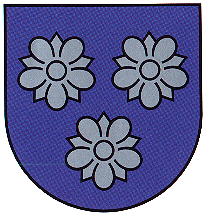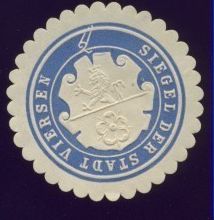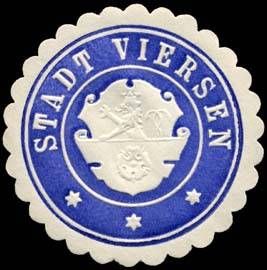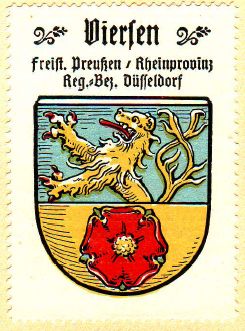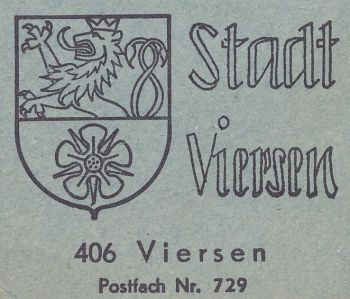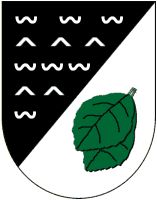Viersen: Difference between revisions
Knorrepoes (talk | contribs) m (Text replacement - ".jpg|center]] <br/>Seal from around 1900" to ".jpg|center|Seal of {{PAGENAME}}]] <br/>Seal from around 1900") |
Knorrepoes (talk | contribs) m (Text replacement - "ä" to "ä") |
||
| (28 intermediate revisions by the same user not shown) | |||
| Line 1: | Line 1: | ||
'''VIERSEN''' | '''VIERSEN''' | ||
| Line 7: | Line 5: | ||
Additions : 1970 : [[Boisheim]], [[Dülken]], [[Süchteln]] | Additions : 1970 : [[Boisheim]], [[Dülken]], [[Süchteln]] | ||
[[File:viersen.jpg|center|Wappen von {{PAGENAME}}]] | [[File:viersen.jpg|center|alt=Wappen von {{PAGENAME}}/Arms (crest) of {{PAGENAME}}]] | ||
= | {| class="wikitable" | ||
In Blau drei silberne Mispelblüten, 2:1 gestellt. | |+Official blazon | ||
|- | |||
|'''German''' | |||
| In Blau drei silberne Mispelblüten, 2:1 gestellt. | |||
|- | |||
|'''English''' | |||
| blazon wanted | |||
|} | |||
===Origin/meaning=== | |||
The arms were granted on April 25, 1974. | The arms were granted on April 25, 1974. | ||
The arms show three medlar flowers, taken from the old arms of Viersen and representing the fact that the city was part of the duchy of | The arms show three medlar flowers, taken from the old arms of Viersen and representing the fact that the city was part of the duchy of Geldern. The medlar is the oldest symbol of Geldern. | ||
The old arms of Viersen showed in the upper half the lion of Geldern, and in the lower a rose. The rose actually should have been a medlar. | The old arms of Viersen showed in the upper half the lion of Geldern, and in the lower a rose. The rose actually should have been a medlar. | ||
| Line 22: | Line 27: | ||
|align="center"|[[File:viersenz1.jpg|center|Seal of {{PAGENAME}}]] <br/>Seal from around 1900 | |align="center"|[[File:viersenz1.jpg|center|Seal of {{PAGENAME}}]] <br/>Seal from around 1900 | ||
|align="center"|[[File:viersenz2.jpg|center|Seal of {{PAGENAME}}]] <br/>Seal from around 1900 | |align="center"|[[File:viersenz2.jpg|center|Seal of {{PAGENAME}}]] <br/>Seal from around 1900 | ||
|align="center"|[[File:viersen.hagd.jpg|center|Wappen von {{PAGENAME}}]] <br/>The arms by [[Otto Hupp|Hupp]] in the [[Kaffee Hag albums]] +/- 1925 | |- | ||
|align="center"|[[File:viersen.hagd.jpg|center|Wappen von {{PAGENAME}}/Coat of arms (crest) of {{PAGENAME}}]] <br/>The arms by [[Otto Hupp|Hupp]] in the [[Kaffee Hag albums]] +/- 1925 | |||
|align="center"|[[File:{{PAGENAME}}60.jpg|center|350 px|Wappen von {{PAGENAME}}/Coat of arms (crest) of {{PAGENAME}}]] <br/>Municipal stationery, 1960s | |||
|} | |} | ||
==Bockert== | ==Bockert== | ||
The village of Bockert , which never was its own municipality, but a borough of Viersen, adopted arms in 1998 : <br> | The village of Bockert , which never was its own municipality, but a borough of Viersen, adopted arms in 1998 : <br> | ||
[[File:vie-bockert.jpg|center]] | [[File:vie-bockert.jpg|center|alt=Wappen von {{PAGENAME}}/Arms (crest) of {{PAGENAME}}]] | ||
The upper half shows seven waves and 5 'roofs', which refer to an old rhyme about the village :<br> | The upper half shows seven waves and 5 'roofs', which refer to an old rhyme about the village :<br> | ||
'Bockert | 'Bockert hätt si'eve Hötte on fiev Pötte' (Bockert has sevel wells and five houses). | ||
The two beech leaves are canting, Bockert is derived from Buchenholz (beech forest). The two leaves refer to the former hamlets of Ober- and Unterbockert. The colours are those of Prussia (black-silver) and its Rhine province (green-silver), as the village developed under Prussian rule. | The two beech leaves are canting, Bockert is derived from Buchenholz (beech forest). The two leaves refer to the former hamlets of Ober- and Unterbockert. The colours are those of Prussia (black-silver) and its Rhine province (green-silver), as the village developed under Prussian rule. | ||
[[Civic Heraldry Literature - Germany|'''Literature''']]: Stadler, 1964-1971, 8 volumes. | |||
{{de}} | |||
{{media}} Info on Bockert from <a href="http://martinsverein.de/bockert.htm" target="_blank">here]]. | |||
[[Category:German Municipalities V]] | [[Category:German Municipalities V]] | ||
Latest revision as of 05:29, 14 April 2024
VIERSEN
State : Nordrhein-Westfalen
District (Kreis) : Viersen
Additions : 1970 : Boisheim, Dülken, Süchteln
| German | In Blau drei silberne Mispelblüten, 2:1 gestellt. |
| English | blazon wanted |
Origin/meaning
The arms were granted on April 25, 1974.
The arms show three medlar flowers, taken from the old arms of Viersen and representing the fact that the city was part of the duchy of Geldern. The medlar is the oldest symbol of Geldern.
The old arms of Viersen showed in the upper half the lion of Geldern, and in the lower a rose. The rose actually should have been a medlar.
| Seal from around 1900 |
Seal from around 1900 |
| The arms by Hupp in the Kaffee Hag albums +/- 1925 |
Municipal stationery, 1960s |
Bockert
The village of Bockert , which never was its own municipality, but a borough of Viersen, adopted arms in 1998 :
The upper half shows seven waves and 5 'roofs', which refer to an old rhyme about the village :
'Bockert hätt si'eve Hötte on fiev Pötte' (Bockert has sevel wells and five houses).
The two beech leaves are canting, Bockert is derived from Buchenholz (beech forest). The two leaves refer to the former hamlets of Ober- and Unterbockert. The colours are those of Prussia (black-silver) and its Rhine province (green-silver), as the village developed under Prussian rule.
Literature: Stadler, 1964-1971, 8 volumes.
This page is part of the German heraldry portal Deutsche Wappensammlung |
Heraldry of the World |
|
German heraldry:
|
Selected collector's items from Germany:
|
Contact and Support
Partners:
Your logo here ?
Contact us
© since 1995, Heraldry of the World, Ralf Hartemink 
Index of the site Info on Bockert from <a href="http://martinsverein.de/bockert.htm" target="_blank">here]].
